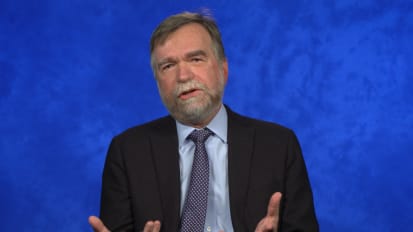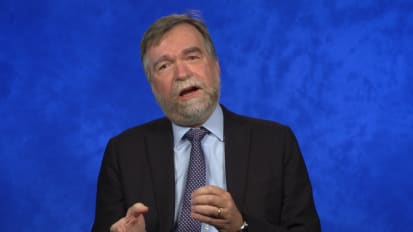Antonio C. Bianco, MD, PhD

Professor of Medicine
Department of Medicine
Division of Endocrinology
University of Chicago
Chicago, IL
Can you summarize the epidemiology, evaluation, quality-of-life issues, and treatment challenges for hypothyroidism encountered by clinicians, including primary care, internal medicine, endocrine, women’s health, and geriatric specialists?
In addition to recognizing subtle clinical signs of hypothyroidism—fatigue, decreased energy, and other non-specific findings—what are the guideline-consistent benchmarks for laboratory evaluation of a person suspected of having hypothyroidism?
What is your approach to persons who have a TSH level between 4.5 and 10? Do they all get treated, or are there other stratification criteria—i.e., the presence of antithyroid antibodies—you use to determine the need for thyroid hormone therapy?
What is the role of the thyroid ultrasound in patients being evaluated for hypothyroidism? And why is confirming the diagnosis critical prior to initiating therapy?
How do you measure clinical success in persons started on thyroid replacement therapy? What balance are you looking to strike in a treatment outcome as it relates to improved laboratory findings and improved patient well-being and quality-of-life?
Although guidelines indicate that normalization of TSH and thyroid hormone levels is an important goal confirming successful treatment with hormone replacement, is this the optimal approach and/or the singular criterion clinicians should focus on?
What is your approach to the patient who has a TSH of 2.5—well within the normal range—but the patient still has symptoms? Is there a rationale for bringing the TSH down to, let’s say, 1. 0 or 0.7, that is, to a lower level within the normal range?
Can you review current ATA-consistent guidelines for specific thyroid replacement formulations initially recommended in newly diagnosed persons with hypothyroidism? Why is T4 (levothyroxine) alone usually recommended as opposed to combination T4/T3?
What is the alternative to using monotherapy with levothyroxine? And what role has dessicated thyroid extract (DTE) played historically in treating hypothyroidism, and what have we learned from this experience?
Once you begin thyroid hormone replacement therapy, how is that patient followed clinically to ensure treatment success? What are the recommended starting doses? How do you titrate the dose over time?
There is a subset of patients who don’t respond to or are dissatisfied with levothyroxine (T4) monotherapy. What percentage don’t respond to conventional therapy? Why is combination therapy with T3/T4 considered appropriate for this group?
Can you give clinicians a sense of how many people treated for hypothyroidism with T4 monotherapy fall into a “less than optimal outcome” category and should be considered for combination approaches, including those that might include DTE?
What is causing the presence of 10-15% of patients with hypothyroidism who are dissatisfied with levothyroxine monotherapy? What is the role of T3 as a causative factor? And what are the implications for combination therapy and/or DTE?
Do you recommend measuring T3 levels in patients who are not satisfied with or symptomatically burdened after being launched on T4? What factors support a decision to embark on combination T4/T3 therapy, either by adding T3 or treating with DTE?
Once you commit a person with hypothyroidism to combination therapy with T4/T3, how do you follow the patient? What have you observed as far as improvements in patient status and/or their perceptions about the effects of combination T4/T3 therapy?
From a front lines clinical perspective, what does the treatment roadmap for combination T3/T4 therapy look like? What approach to combination therapy do you recommend for the primary care, internal medicine, and/or women’s health specialist?
What practical advice would you give to physicians who are not familiar with the specifics of how to initiate and/or monitor therapy with DTE? Are conversion tables available? Is there data to suggest which approach is better—DTE or T4/T3 (Cytomel)?
Among patients who are started on combination therapy with DTE or add-on T3, what do your patients report? What is the trial-based evidence that supports use of DTE in a selected group of patients failing to respond optimally to T4?




















